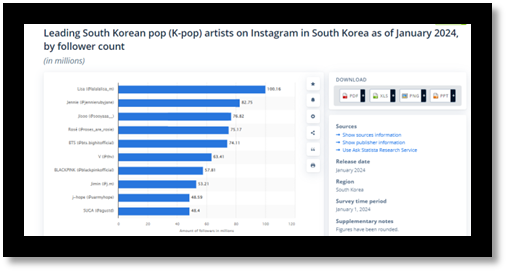The K-Pop industry, long known for its meticulously controlled and agency-centric model, is experiencing a dramatic shift in power. At the forefront of this transformation stands Lisa of BLACKPINK, embodying a growing movement of artists reclaiming their creative autonomy and individual voices.
For decades, popular artist managing agencies, such as YG entertainment (formally managed BLACKPINK) and HYBE (manages BTS), were the gatekeepers of K-Pop Industry. The agencies meticulously craft every aspect of idol’s persona- from their personal relationships and diet regimes to career trajectories and public perceptions.
While this system is known to produce global superstars, the industry has also faced increased backlash from artists and fans from around the world.
The instances of such companies promoting teenagers sexually, underpaying their recruits, exploitative practices and closely controlling the private life such as banning these stars from dating are well-known globally.
Many former K-Pop artists have revealed the horrors of working under an agency in K-Pop industry in Korea.
However, a new wave of artists is rewriting the narrative- Lisa, the 26-year-old Thai rapper, singer, and dancer has also joined the movement. Lisa is one of the four members of all girls, K-Pop band called BLACKPINK, which is also the most popular K-Pop band after BTS.
Since autumn last year, the controversy around BLACKPINK members renewing their contracts were circulating around the internet. This came after news that some artists are starting their own labels instead of renewing their contracts went viral.
Lisa has started her self-management label called LLOUD, which will manage her personal portfolio and individual projects. Currently, Lisa is the sole artist listed under the label, where she wishes to collaborate with like-minded people to create authentic music.
In addition to her music career, Lisa has also signed a deal with HBO's upcoming comedy series- The White Lotus. The White Lotus season three is set to debut in 2025.
Lisa is the most followed K-pop artist on Instagram with 100.2 million followers. Not only this, Lisa ranked 4th among the top 30 most searched K-pop idols on Google and number one worldwide as a female idol.

Lisa's entrepreneurial journey have garnered significant attention and adoration from her fans, known as Blinks, who have praised her for her courage and dedication.
Jennie, another member of BLACKPINK, takes center stage with her entrepreneurial debut launching "GENTLE MONSTER Jentle by Jennie," blending high-end eyewear with her trendsetting style. With a successful acting career on the rise, Jisoo's future shines bright on screen. Her upcoming lead role in the film "Omniscient Reader" marks a major step in starting her acting career.
The golden-voiced vocalist, Rosé, balances the sweet melodies of solo projects with the electrifying energy of BLACKPINK. With her bucket list including hosting fan meetings and releasing more music, Rosé seems focused on connecting with fans both individually and collaboratively.
The fight for fair treatment in K-pop industry is a growing movement, with several brave artists stepping out against their agencies' stringent rules.
Hwayoung of T-ara boldly challenged defamation and unfair treatment through legal action. Goo Hara, formerly of Kara, tragically shed light on abuse and exploitation before her passing. Wonho of Monsta X faced immense pressure and ultimately left the group after false accusations, later cleared. Jiwon from Cherry Bullet prioritized mental health over agency pressures by opting to leave the group.
But at the bottom of it, the question lies that why Korean entertainment industry is rigid and controlling, yet shimmers with talent and hope.
The Korean Entertainment Industry: A Paradox of Talent and Turnover
While South Korean entertainment industry cultivates and showcases stars like BLACKPINK's Lisa, it frequently fails to provide the nurturing environment necessary to retain them.
In Korea, it is very common to recruit young trainees, as young as ten years old. These trainees are put under rigorous training and immense pressure from a young age. KFTC Report on Unfair Contracts (2021) found that 70% of trainee contracts contained unfair terms on profit sharing and training costs in Korea.
On top of that, sleep deprivation, limited contact with family, and strict diets are not uncommon, raising concerns about exploitation and child welfare. A research by Seoul National University reveals that 78% of surveyed idols experienced anxiety and 54% experienced depression.
The research data also highlights that high number of trainees doesn't translate to high debut rates, indicating potential exploitation and churn.
This imbalance highlights that the industry continuously exploits talented artists for profits, but fail to cater to their well-being.
Yet, amidst a vast sea of young enthusiasts idolizing these artists and keenly unaware of their hardships, the industry remains perpetually filled with ambitious dreamers yearning to try their luck and ascend to the heights of worldwide fame.
This is a never0ending cycle of fame, where established artists seek to escape its pressures, while aspiring talents relentlessly chase after it.
Conclusion:
The only way to break-out of the cycle is to introduce fair norms for young artists to prevent their exploitation. This includes fairer contracts and better work-life balance. While trailblazers like Lisa have taken steps forward, achieving this goal remains a distant reality given the current circumstances.
Copyright © 2026 getessayservice.com

